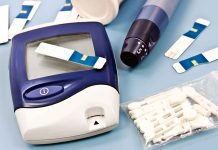
Concerned About Colon Cancer? Here’s How The Blood Test Works
(AscendHealthy.com) – Cancer is a scary diagnosis. That’s why health care professionals—doctors, insurance companies, and even the government—aggressively promote testing and screening for so many types of cancer. Researchers are finding better ways to treat and even cure some cancers every day, so it makes sense to encourage people to get tested when the time comes.
Every cancer different, but research shows that there are common threads for the ages certain cancers occur. Colon cancer, for example, is most likely to occur after you’re 60, so that’s when you should add routine screenings to your health care routine.
Where would I get colon cancer?
Your intestine is part of your digestive system. It starts just past your stomach and ends at your rectum, and if you were to lay it out in a straight line, it’s about 20 feet long (large and small combined). Cancer cells can grow in the lining of the intestine, or at the end of the line at the rectum—that’s why it’s also called colorectal cancer, but it’s basically the same thing.
How do I know if I’m at risk?
If you have a family history of colorectal cancer, are obese, diabetic, or have inflammatory bowel disease (IBS), you are at a higher risk for the disease. Smoking, drinking alcohol, and eating red or processed meat might increase your risks. Anyone over 60 also has a greater chance of getting colon cancer.
What are the symptoms?
If you haven’t had a preventative screening for colorectal cancer and you have any of the following symptoms, it’s definitely time to get tested.
- Abdominal pain
- Bloody stool
- Diarrhea
How do they test for colon cancer?
There are two types of tests for colon cancer: stool and visual.
Stool
You’ve probably seen the ads on TV for at-home colon cancer tests. These are similar to the stool tests you’d have done at your doctor’s office, where the stool is assessed for the markers of cancer cells. Microscopic amounts of blood in the stool are indicators that cancer cells or polyps are present in the intestinal lining.
Other stool tests look for the DNA markers or genetic changes that also might indicate polyps or cancer cells.
These tests are not as conclusive or as long-lasting as visual testing. They need to be repeated every year or three years.
Visual
The most definitive test for colon cancer is a colonoscopy. This a procedure at your doctor’s office where a tiny camera is inserted in a tube and scoped through your intestine via the rectum, or with imaging tests, which are certainly less invasive.
What about blood tests?
There are no blood tests to screen for colon cancer, but your doctor may order blood tests if they suspect cancer cells are in your colon or rectum. These blood tests reveal tumor markers—proteins your body makes in response to cancer.
So why would doctors run blood tests to look for tumor markers, but not to diagnose colon cancer? Because these markers are not always reliable, one way or the other. The most common marker, carcinoembryonic antigen (CEA), may present at normal levels for people with cancer. Also, these markers could be abnormal for other reasons. Diagnosing colon cancer is a multi-layered process that requires several types of tests to accurately assess and determine treatment.
Blood tests are common for colon cancer patients. Your doctor may order a Complete Blood Test (CBC) test for anemia, for example, if they think you have a bleeding tumor—the anemia is a result of the blood loss in your body. Other blood tests measure the enzymes in your liver, which is at risk for the cancer spreading from the colon.
Blood tests are not the primary (or even common) way that physicians diagnose colon cancer, but they are an invaluable tool in fine-tuning the diagnosis and determining treatment plans. Talk to your own physician if you have any concerns.
Copyright 2023, AscendHealthy.com




















